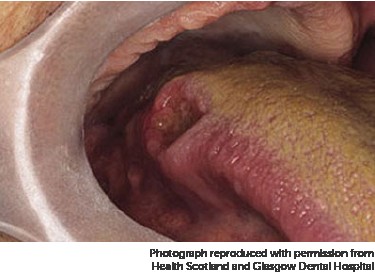A lump on your tongue can be alarming. While it’s often harmless, it could be a sign of a more serious condition like tongue cancer. This article explores the potential causes of tongue lumps, symptoms to watch out for, and when to seek medical attention.
Understanding Tongue Lumps: Possible Causes
Several factors can contribute to the development of a lump on your tongue:
Injury or Trauma:
Accidental biting, burns from hot food or drinks, or irritation from sharp objects can cause swelling or lumps. These are usually temporary and heal within a few days.
Canker Sores:
These small, painful ulcers can appear on the tongue and often have a white or yellowish center with a red border. They are usually benign and resolve on their own within a week or two.
Oral Thrush:
A fungal infection caused by Candida albicans, oral thrush can lead to white patches or lumps on the tongue. It’s more common in people with weakened immune systems.
Leukoplakia:
This condition causes thick, white patches to form on the mucous membranes of the mouth, including the tongue. While usually benign, leukoplakia can sometimes be a precursor to cancer.
HPV Infection:
Human Papillomavirus (HPV) is a common sexually transmitted infection that can increase the risk of certain types of cancer, including tongue cancer.
Tongue Cancer:
A lump on the tongue that doesn’t heal, is accompanied by pain, numbness, or bleeding, and is persistent could be a sign of tongue cancer.
Recognizing Tongue Cancer Symptoms: When to Worry
While a lump is a possible indicator, several other symptoms can suggest tongue cancer:
- Persistent Sore Throat: A sore throat that doesn’t improve with time.
- Unexplained Pain: Pain in the mouth, tongue, or ear, especially when swallowing.
- Numbness: Persistent numbness in the mouth or tongue.
- Difficulty Swallowing or Speaking: Problems with normal oral function.
- Red or White Patches: Lesions on the tongue that don’t heal.
- Bleeding: Unexplained bleeding from the tongue.
- Lump in the Neck: Swollen lymph nodes in the neck.
- Unexplained Weight Loss: Significant weight loss without trying.
Risk Factors for Tongue Cancer
Certain lifestyle choices and factors can increase the risk of developing tongue cancer:
- Tobacco Use: Smoking cigarettes, cigars, or pipes significantly increases the risk.
- Excessive Alcohol Consumption: Regularly drinking large amounts of alcohol is a major risk factor.
- HPV Infection: Certain strains of HPV are linked to an increased risk of oral cancers.
Seeking Medical Attention
If you have a lump on your tongue that persists for more than two weeks, or if you experience any of the symptoms mentioned above, it’s crucial to consult a doctor or dentist immediately. Early detection and diagnosis are essential for effective treatment of tongue cancer. A medical professional can perform a thorough examination, including a biopsy if necessary, to determine the cause of the lump and recommend appropriate treatment options. Remember, most tongue lumps are benign, but it’s always best to err on the side of caution and seek professional medical advice.
